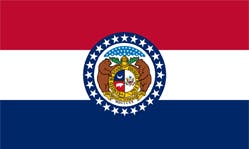Thanks to growing networks and expanding benefits, Medicare Advantage (MA) has nearly doubled in popularity over the past decade. Also known as Medicare Part C, the program now has over 31 million enrollees, accounting for 51% of eligible Medicare beneficiaries. This page explains Medicare Advantage plans in Missouri and how the program works.
What is Medicare Advantage in Missouri?
Medicare Advantage plans must provide the same level of coverage as you would get with Original Medicare.
There are two parts to Original Medicare. Medicare Part A covers inpatient services such as you'd receive in a hospital or skilled nursing facility (SNF). Medicare Part B covers outpatient services, including doctor visits, lab work, outpatient procedures performed in a hospital, durable medical equipment (DME), and more.
Original Medicare does not include prescription drug coverage. For that, you need Medicare Part D.
One reason Medicare Advantage keeps growing in popularity is that most plans offer additional benefits. The most common are:
- Fitness programs like SilverSneakers
- Prescription drug coverage
- Routine vision and dental care
Please note that, even if you join a Medicare Advantage plan in Missouri, you are still responsible for the Medicare Part B premium.
Missouri Medicare Advantage plans with prescription drug coverage
Medicare Advantage Prescription Drug plans (MA-PD) combine your Original Medicare and Part D benefits into one plan.
Also known as an all-in-one plans, many members find they save money with an MA-PD, particularly if it includes dental and/or vision coverage.
How do you qualify for Medicare Advantage in Missouri?
If you have Medicare Parts A and B, you qualify for Medicare Advantage in Missouri.
American citizens and permanent legal residents become eligible for Medicare when they turn 65. If you began collecting Social Security benefits at least 4 months before your 65th birthday, enrollment in Parts A and B is automatic. Everyone else must apply for Medicare.
You don't have to wait until you turn 65 if you collect disability benefits from either Social Security or the Railroad Retirement Board (RRB) for 24 months. Anyone who qualifies due to a disability is automatically enrolled in both Parts A and B during month 25.
Finally, if you have either amyotrophic lateral sclerosis (ALS, or Lou Gehrig's disease) or end-stage renal disease (ESRD), you may also qualify for Medicare before turning 65.
When can you sign up for a Medicare Advantage plan in Missouri?
Medicare limits enrollment to specific enrollment periods.
Your Initial Enrollment Period (IEP) begins 3 months before your Medicare eligibility month and lasts for 7 months. So, if your 65th birthday or 25th month of collecting disability benefits occurs in January, your IEP lasts from October 1 through April 30.
If you did not sign up for Medicare Part A and/or Part B during your IEP, you may do so during the General Enrollment Period, which lasts from January 1 through March 31. After General Enrollment ends, you may then sign up for a Medicare Advantage plan between April 1 and June 30.
You may also sign up for an MA plan during the Medicare Annual Enrollment Period (AEP) from October 15 through December 7.
If you already have a Part C plan, the Medicare Advantage Open Enrollment Period lets you switch to a new MA plan. Your second option is to return to Original Medicare. If making that change means you'll lose your prescription drug coverage, you may also enroll in a standalone Part D plan. You have from January 1 to March 31 to act.
You may also join a Medicare plan during a Special Enrollment Period (SEP) if you experience certain life changes. There are dozens of ways to qualify. The full list is on Medicare.gov.
Types of Medicare Advantages plans in Missouri
There are four common types of Medicare Advantage plans in Missouri.
More than half of all MA plans are health maintenance organizations. HMOs help manage costs with a provider network, which may include nearly any entity that provides healthcare services. You may be responsible for 100 percent of the costs if you receive non-emergency care from an out-of-network. HMOs also require members to choose a primary doctor and get a referral before seeing a specialist.
Preferred provider organizations (PPO) use a provider network, but members may receive out-of-network care for a higher copay. PPO plans do not require members to choose a primary care doctor. Members also don't need a referral to see a specialist.
A private fee-for-service (PFFS) plan sets costs for covered services. Some use a provider network but do allow members to receive out-of-network care for a higher price. With a PFFS plan, you don't have to choose a primary doctor or get a referral for a specialist.
Special needs plans (SNPs) limit membership to people who meet certain criteria. SNP plan guidelines may include:
- Having a chronic condition (e.g. chronic heart failure, diabetes, HIV/AIDS, dementia, or ESRD)
- Living in an institution (such as a nursing home) or requiring at-home care
- Being dual eligible (i.e. qualifying for both Medicare and Medicaid)
SNPs also require their members to choose a primary doctor who coordinates the patient's care and provides referrals to specialists.
How to choose a Medicare Advantage plan in Missouri
When comparing Medicare Advantage plans in Missouri, consider the following:
- Costs: May include a yearly deductible, monthly premium, and copays or coinsurance.
- Coverage: Benefits vary from plan to plan, so make sure you're comparing apples to apples. If it's an MA-PD plan, don't forget to check the drug formulary.
- Network: If you have complicated or preexisting conditions, you may want a plan whose network includes your providers.
- Ratings: Medicare uses a 5-point rating system and releases its findings each fall before Annual Enrollment.
Our Find a Plan tool makes it easy to compare Medicare Advantage plans in Missouri. Just enter your location information to review Medicare plans in your area.
